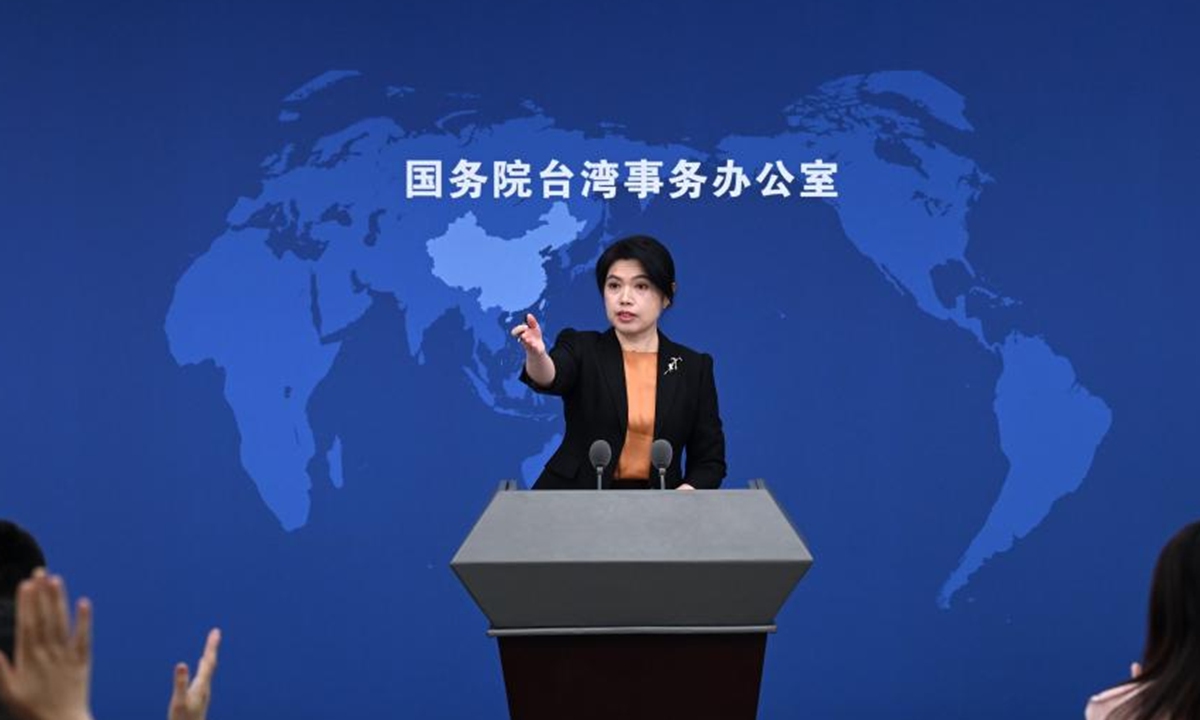
Zhu Fenglian Photo: Xinhua
In response to an inquiry about Taiwan regional education authorities banning exchanges and cooperation with universities in Chinese mainland, including Jinan University and Huaqiao University, citing so-called excuses of "protecting young people from being targeted by the united front," Zhu Fenglian, a spokesperson for the State Council Taiwan Affairs Office, said that the claim by DPP authorities is pure nonsense and utterly absurd.
In recent years, the DPP authorities have become increasingly paranoid about the idea of unification and have reacted with opposition to anything related to the mainland. Their actions have reached a point with no bottom line and no limits, and will certainly face strong opposition from universities, students, and parents on the island of Taiwan, said Zhu.
Cheng Ying-yao, head of the education department in Taiwan island, said last week that cooperation or exchanges between universities in Taiwan island and those affiliated with the United Front Work Department (UFWD) of the Communist Party of China Central Committee will be prohibited, and that in the future the education department will not recognize the qualifications of these universities, according to media.
The three universities listed are Huaqiao University in Xiamen, East China's Fujian Province, Jinan University in South China's Guangdong Province, and Beijing Chinese Language and Culture College, according to the report.
Zhu said on Wednesday that both Jinan University and Huaqiao University are well-known universities in the Chinese mainland, renowned for their academic standards and social reputation, both domestically and internationally. Over the years, both universities have cultivated a large number of excellent students, including those from Hong Kong, Macao, Taiwan, and overseas Chinese communities, making important contributions to strengthening ties between the mainland and Hong Kong, Macao, and Taiwan.
Zhu said that the united front work is about bringing people together, fostering consensus, gathering wisdom, and building strength. United front work is legitimate and proper. The DPP authorities' repeated attempts to smear united front work expose their inner fear and their unscrupulous attempts to control the thoughts of the residents in Taiwan, depriving them of their right to choose higher education and serving the DPP authorities' "Taiwan independence" separatist agenda.
On Wednesday, Zhu also refuted a recent claim made by Chiu Chui-cheng, head of the so-called "mainland affairs council," regarding the mainland's "restriction" on students coming to Taiwan, while simultaneously seeking to attract students from the Taiwan island to study and exchange in the mainland.
Zhu said that the DPP authorities' claims distort the facts and turn truth upside down. The mainland has always been a promoter of exchanges and interactions across the Taiwan Straits, while the DPP has consistently been an obstacle and disruptor.
The DPP authorities continuously hyped so-called threat from the mainland, treat normal cross-Straits exchanges as dangerous and smear the interactions between students and young people from both sides as a "united front conspiracy," said Zhu, noting that their goal is to escalate hostility and confrontation and create an information cocoon that serves their separatist agenda.
Such regressive actions are strongly opposed by people on both sides of the Taiwan Straits, said Zhu.
As long as the DPP authorities maintain their confrontational mind-set, cross-Straits relations cannot improve. If they truly wish to see mainland students resume studying in Taiwan, they should remove the various obstacles they have placed on cross-Straits personnel exchanges and cooperation, instead of using deceptive tactics to create a false impression that even if the 1992 Consensus is not recognized, cross-Strait dialogue and negotiations are possible, Zhu said.




